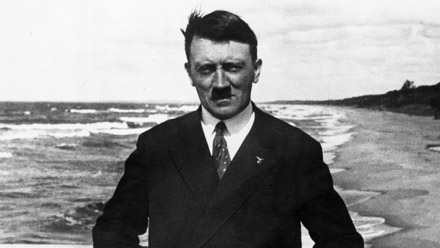Adolf Hitler was a 'super junkie', claims new book
Author Norman Ohler says the German fuhrer turned to drugs after Von Stauffenberg's assassination attempt in 1944

A free daily email with the biggest news stories of the day – and the best features from TheWeek.com
You are now subscribed
Your newsletter sign-up was successful
A new book claims to have uncovered the true scale of Adolf Hitler's long-rumoured addiction to drugs.
"Germany, land of drugs, of escapism and worldweariness, had been looking for a super-junkie," Norman Ohler, the author of Blitzed: Drugs In Nazi Germany, writes. "And it had found him, in its darkest hour, in Adolf Hitler."
What does the book reveal?
The Week
Escape your echo chamber. Get the facts behind the news, plus analysis from multiple perspectives.

Sign up for The Week's Free Newsletters
From our morning news briefing to a weekly Good News Newsletter, get the best of The Week delivered directly to your inbox.
From our morning news briefing to a weekly Good News Newsletter, get the best of The Week delivered directly to your inbox.
Ohler claims Hitler's addiction began after Claus von Stauffenberg's assassination attempt in 1944. The bomb planted in a briefcase under his desk turned the German fuhrer into a "nervous wreck", he says. "I'm afraid that from 1944 onwards, Hitler did not spend a single day sober," claims the author.
He says that Hitler turned to a range of drugs, including a heroin-like substance called Eukodel, to help him cope, making his behaviour and decision-making even more erratic.
The effect of the drugs could appear to onlookers "to be little short of miraculous", says The Guardian. "One minute the Fuhrer was so frail he could barely stand up, the next he would be ranting unstoppably at Mussolini," it adds.
Before then, Hitler was a very public person, Ohler says. "But the attempt on his life left him withdrawn, paranoid and anxious."
A free daily email with the biggest news stories of the day – and the best features from TheWeek.com
The claims are backed up by extracts from the diary of Dr Theo Morell, Hitler's personal doctor, who said the Nazi leader's addiction was so severe almost all of his veins had collapsed.
"I cancelled injections today to give the previous puncture holes a chance to heal," wrote Morell.
There are also records of Hitler's ill health in the final days of World War II, as he hid out in his bunker with none of his drugs left.
Ohler blames his state on the addiction. "It must have been pretty awful," he says. "He's losing a world war, and he's coming off drugs."
What has the reaction been?
British historian Ian Kershaw, a leading authority on Hitler and Nazi Germany, described the book as a "serious piece of scholarship" from an author who has never written non-fiction before.
"This astonishing account of methamphetamine addiction in the Third Reich changes what we know about the Second World War," The Guardian says.